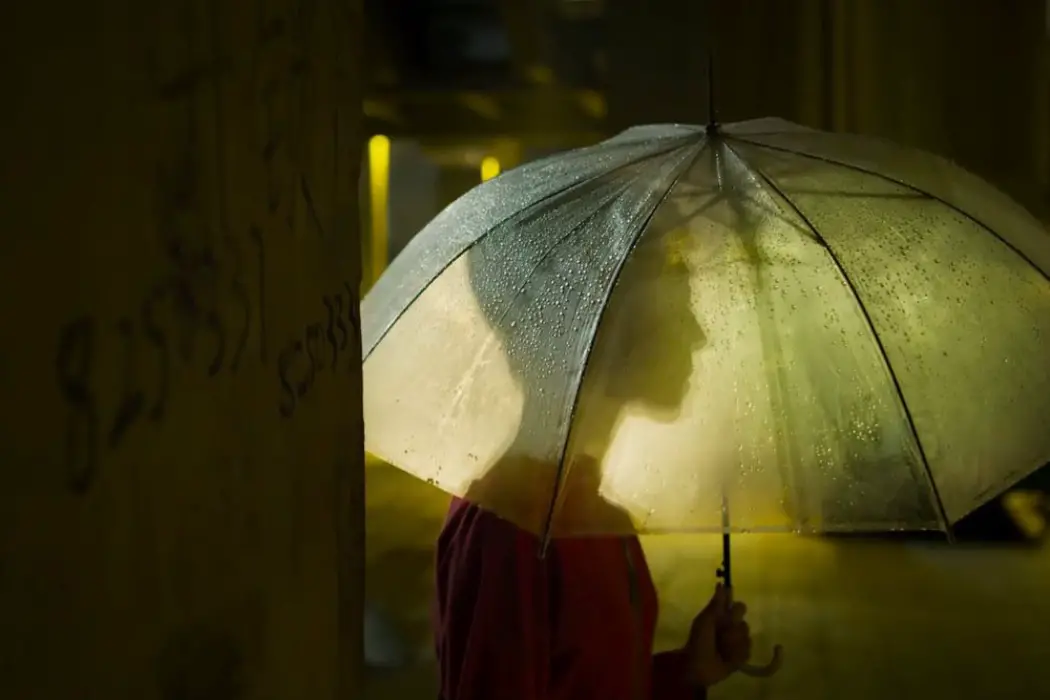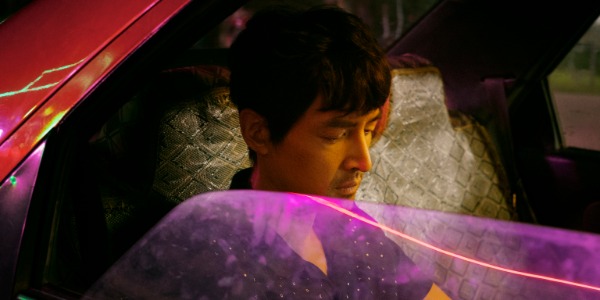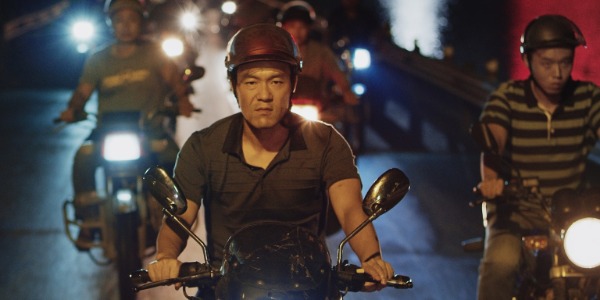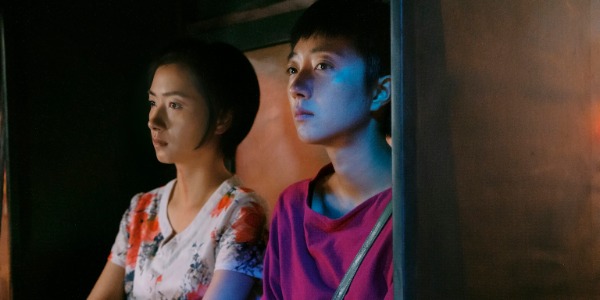THE WILD GOOSE LAKE: Bleak, Restrained & Sensuous Film Noir

I'm a student at the University of North Carolina at…
An austere and intense crime story accentuated by moments of extreme and gruesome violence, Diao Yi’nan‘s The Wild Goose Lake is a quintessential example of modern film (neo)noir. The film has all the necessary ingredients: a protagonist in an existential quagmire, a duo of complex, contrasting femme(s) fatale with sympathetic motives, and a series of double-crosses and elaborate schemes from a gallery of shady rogues, with a determined cop pursuing our anti-hero at every turn. Complete with flashbacks and surprising detours, Diao‘s film appears to be a fairly familiar thriller, from its minimalist opening all the way to its grim (yet hopeful) conclusion.
But narrative appearances aren’t everything in The Wild Goose Lake. The question of how this straightforward concoction of boilerplate crime tropes plays out is more important than any single element’s effectiveness. What could have been perfunctory (though not necessarily unsatisfying) in theory is much moodier and more involving in practice: an experiential sensory journey that translates its story’s own merciless darkness into a unique sort of atmospheric immersion. The relentless sound of rain and the steadfast restraint of open emotion combine to create something oppressively gloomy and striking, though its cumulative effect is less memorable than it is merely aesthetically pleasing.
From Gang Feud to Nationwide Manhunt
Outside a dilapidated train station in China, bloodied and bruised gangster Zhou Zenong (Hu Ge) is hiding out for an unknown reason, with only a small bag in tow. Soon, he’s approached by a woman with an umbrella: this is Liu Ai’ai (Kwei Lun-Mei), who comes with news from his family and allies. Zenong’s wife (Wan Qian) won’t be joining him, and while longtime friend Huahua (Qi Dao) wants to help, he’s still maintaining his distant from his disgraced friend. As they plan their next moves, Zenong recalls how he got to this point, and the bloody saga that has turned him into one of the most wanted men in Wuhan, China.

Recently out of prison, Zenong was initially hoping to regain his territorial foothold with a powerful gang responsible for selling drugs and stealing large numbers of motorized bikes. After tempers flare, an ally of Zenong shoots their rival in the leg, turning a small dispute into a full-on feud. When his friend is murdered and an attempt is made on his life, Zenong goes on the run — and kills an innocent local police officer in the process. Pursued by the brilliant Captain Liu (Liao Fan), Zenong is now truly on his own; to make matters worse, there’s a ¥300,000 bounty on his head.
Later, we learn a few more details about Ai’ai, a prostitute and “bathing beauty” with some recent connections to Shujun, Zenong’s wife. With Ai’ai and Zenong’s fellow friends all searching for Shujun in order to help her obtain the reward money, they eventually realize a terrible truth: Shujun is already aiding the police. Out of options and destined for a bloody end, Zenong decides to team up with Ai’ai to evade Captain Liu as long as possible, hoping to ultimately get some financial upside by the time all’s said and done.
Slow Pace, Serious Characters
On paper, the narrative is fairly simplistic, but the expansive network of friends and adversaries seeking Zenong can actually get rather murky in context. The film’s signature mood is all-encompassing, with architectural and environmental textures that reach acute and palpable levels of vividness. It’s easy to piece together the shocking, grisly basics of how Zenong got in this situation, but in the somber aftermath of tragic events, the pacing can provide a different visceral sensation. While this experience of the film’s plotting may be entirely subjective, there is a nearly somnambulistic quality in Diao‘s filmmaking, as long, dialogue-free sequences take the place of more traditional forms of emotion and exposition.

Like many of last year’s titles at the Cannes Film Festival (I’m thinking particularly of Corneliu Porumboiu‘s The Whistlers, a similarly slow, poignant revision of crime movie tropes), Diao‘s film dabbles in the realm of slow cinema, even if its bright colors and hyper-stylized violence keep it firmly in a more familiar generic mode. Dong Jingsong‘s cinematography and the brief flashes of kinetic music liven up the proceedings, but the pace can be utterly glacial at times. When Diao isn’t filling in the details of Zenong and Ai’ai’s precarious situation, he often provides extended time to let his characters sulk, their angst bleeding into the moodiness of the overall piece.
This slowness is, in fact, closely attached to the personalities of the characters, who have been rendered emotionally inert and painfully lonely by the violence of their respective worlds. They’re men and women of few words, preferring to make strategic moves and simmer in quiet. Hu Ge is terrific as Zenong, who, less-than-admirable qualities and all, is a genuinely great noir protagonist; he’s all fatalistic sulking and pure desperation. Out of options, he’s the badass who can take a beating. And even though their relationship feels murky, there’s some palpable and (narratively) necessary chemistry with Kwei Lun-Mei‘s Ai’ai. Built on silence and mutual need, their relationship enables some of the more tender — and intermittently baffling — moments of the entire film.
Grim Moods & Atmospheric Details
Unfortunately, the internal nature of these characters doesn’t quite pay off as well as one would hope. Its slowness and its noir features initially complement each other well, but as the narrative reaches its climax, Diao has a more difficult time reconciling the conflicting nature of action and stillness. Even with the right pieces in place for a finale that both maintains a level of fidelity to the expected tragedy and provides a necessary catharsis, The Wild Goose Lake doesn’t quite solve the puzzle. Diao hits some effective notes, but the whole affair never truly rouses the emotions.

Yet with all this talk of slowness and moody characters, it’s possible that I’m underplaying how much The Wild Goose Lake has to offer on the level of pure aesthetic enjoyment. Assisted by Dong‘s mesmerizing cinematographic achievement, Diao moves from silent moodiness to frenetic ultraviolence at the drop of a hat — the bloody, necessary result of a film that simmers until it explodes.
To put it in more crude terms: how could anyone not be somewhat impressed by a quiet, thoughtful noir that also features someone being stabbed with an umbrella, resulting in a bonkers explosion of blood? Beyond the absurdity of the conflict between the characters’ po-faced posturing and the ridiculous violence, Diao also emerges as something of a master of action filmmaking. Giant, labyrinth-like buildings are the backdrop for intense chases, resulting in sequences where the camera could suddenly spot a new, dangerous threat around every corner.
The Wild Goose Lake: Conclusion
The occasional dip into aesthetically elevated seediness isn’t always effective: a random bit of sexual violence in the final act is nauseatingly ill-conceived, an example of underworld exploitation that is as needless as it is disgusting. Regardless, The Wild Goose Lake‘s glaring missteps aren’t enough to sink the film and its overall affect, which remains consistent and engaging throughout. Even if the narrative doesn’t always hold up, the sensory bodily experience provided by Diao‘s singular combination of graphic bloodshed and slow pacing remains unique and powerful.
What did you think of The Wild Goose Lake? Are you a fan of Black Coal, Thin Ice, director Diao Yi’nan’s last major feature? Let us know in the comments below!
The Wild Goose Lake was released in the US on March 6, 2020. For full international release dates, click here.
Does content like this matter to you?
Become a Member and support film journalism. Unlock access to all of Film Inquiry`s great articles. Join a community of like-minded readers who are passionate about cinema - get access to our private members Network, give back to independent filmmakers, and more.
I'm a student at the University of North Carolina at Chapel Hill. For 8 years, I've edited the blog Martin on Movies. This is where I review new releases, cover new trailers, and discuss important news in the entertainment industry. Some of my favorite movies- Casablanca, Inception, Singin' in the Rain, 2001: A Space Odyssey, The Wolf of Wall Street, The Nice Guys, La La Land, Airplane!, Skyfall, Raiders of the Lost Ark. You can find my other reviews and articles at Martin on Movies (http://martinonmovies.blogspot.com/).













